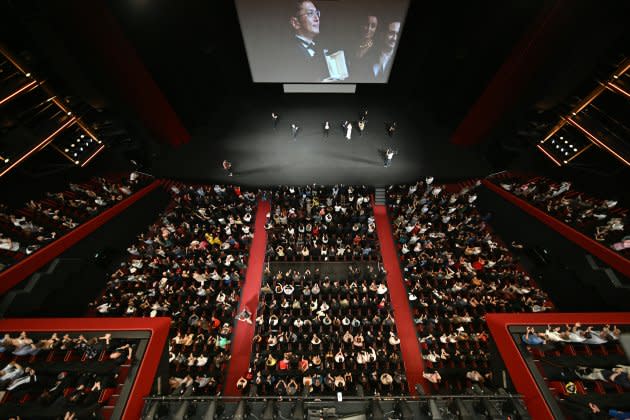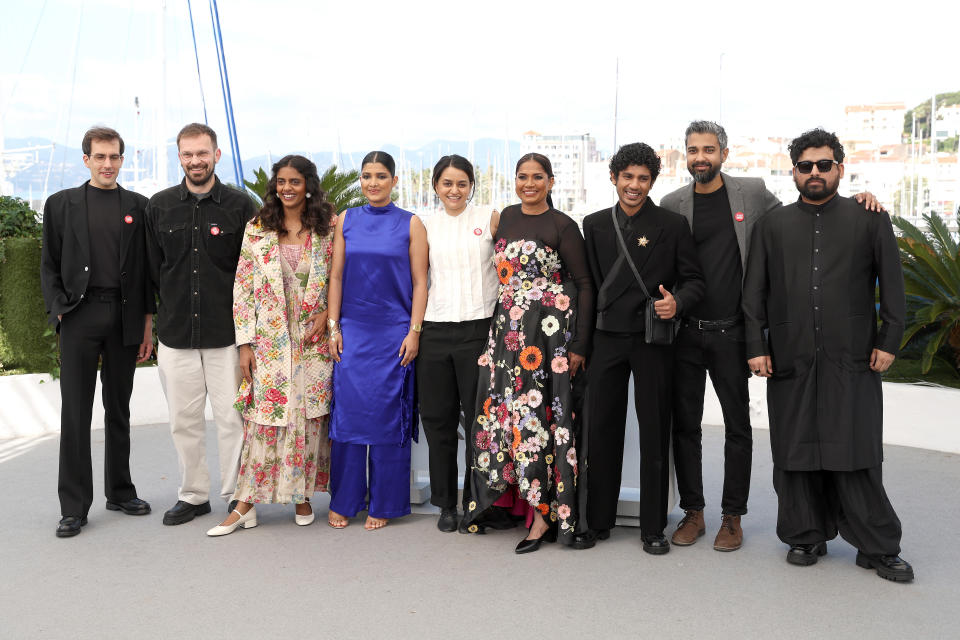Cannes Film Festival Workers Criticize Management & French Government Over Stagnant Salary Talks And Warn Of Mass Exodus From Industry

France’s Precarious Film Festival Workers Collective has warned that the Cannes Film Festival and France’s other major film events will be at “risk” due to a widescale exodus from the industry by festival staffers after plans they drew up to resolve their ongoing pay dispute were “rejected” by the French culture and labor ministries.
The collective, which includes staffers from the Cannes Film Festival alongside workers from other festivals across France met with Cannes Film Festival management, the CNC, the French Ministries of Labor and Culture, the CGT, and France’s other major entertainment unions this week in Cannes to discuss a plan to streamline the complex hiring and compensation process for French festival workers.
More from Deadline
In a statement sent to Deadline, the collective said “Despite the urgency of the situation shared by all parties,” the French Ministries of Culture and Labor “rejected any hypothesis of exceptional or transitional measures to rapidly resolve the problem of festival workers’ living standards.”
You can read the whole statement from the collective below. The group states that the French government and all the parties involved in the talk did, however, pledge to iron out a long-term plan to restructure their pay packages and include festival workers into France’s intermittence system, which ensures regular income for workers in the entertainment sector.
However, the group said any delay or prolonged resolution would have major effects on their lives and the running of France’s major film events.
“By the time it is translated into concrete measures, many of us will have reached such low levels of compensation between contracts that we will have given up our profession, depriving festivals of their expertise, “ the group said.
“Indeed, without the assurance of joining the intermittence scheme at the end of this structuring process, festivals are likely to find themselves on a dead branch.”
The group’s statement ends: “The response we have received does not seem commensurate with the situation in which hundreds of workers find themselves. We are not giving up our demands.”
The statement was signed by Directors’ Fortnight, Critics’ Week, ACID, Carrefour des festivals — representing more than sixty festivals — and CGT Spectacle, the largest French union for entertainment workers. The Cannes Film Festival didn’t immediately respond to our request for comment on the talks.
The Precarious Film Festival Workers Collective has had a small but sustained presence at Cannes this year, with festival staff and attendees donning the collective’s bright red badge around town and at festival venues. Collective members also launched a rooftop protest at Palais on opening night.

Cannes Film Festival head Thierry Frémaux addressed the collective head-on in his opening day presser, telling journalists in the room that negotiations were ongoing with the collective and the festival has engaged directly with them on the issue.
The Cannes Film Festival ends May 25.
Statement
Tuesday May 21, a meeting was held in Cannes between the Ministry of Labor, the Ministry of Culture, the CNC, Carrefour des festivals, the Festival de Cannes, the Quinzaine des Cinéastes, the Semaine de la critique, the ACID, the CGT spectacle, the F3C CFDT and the collective of precarious workers “Sous les écrans la dèche”.
We reiterated our main demand: the urgent affiliation of all film festival employees to the intermittence system, the only one that would allow us to make a decent living from our work. Festival representatives and unions are working alongside us to defend this demand, because our survival depends on it, as does that of the events we work with.
Despite the urgency of the situation shared by all parties, the Ministries of Culture and Labor have rejected any hypothesis of exceptional or transitional measures to rapidly resolve the problem of festival workers’ living standards. They argued that the only way to bring certain professions under the intermittence scheme would be to link them to a branch and its collective agreement. They therefore put the responsibility back on the social partners.
The French Ministries of Culture and Labor are offering us support in structuring the sector, with a view to signing a collective agreement in the coming months. In the long term, this collective agreement could make it possible to integrate “certain film festival technician jobs” into the intermittence system. On the deteriorating standard of living, the desertion of the sector, and consequent loss of skills, all consequences of the successive unemployment insurance reforms carried out by their government, which have led to a drastic reduction in compensation between two contracts: nothing. On the forthcoming unemployment insurance reform to be adopted on July 1, which further weakens and threatens certain sectors whose activity is not continuous and requires skilled employees available for short periods: nothing.
The parties present at the meeting are nevertheless committed to following this necessary structuring process, which will make it possible to define minimum wage scales adapted to the size of festivals, to regulate working hours, and provide employees with social security cover. But they are asking for a transitional measure applicable from now on for the months that this structuring process will last.
The Ministries of Labor and Culture have undertaken to “estimate the economic impact of the planned contractual coverage on festival budgets”. By the time it is translated into concrete measures, many of us will have reached such low levels of compensation between contracts that we will have given up our profession, depriving festivals of their expertise. Indeed, without the assurance of joining the intermittence scheme at the end of this structuring process, festivals are likely to find themselves on a dead branch.
The response we have received does not seem commensurate with the situation in which hundreds of workers find themselves.
We are not giving up our demands. The “Sous les écrans la dèche” collective
With the support of SRF, Directors’ Fortnight, Critics’ Week, ACID, Carrefour des festivals – representing more than sixty festivals – CGT spectacle and F3C CFDT.
Best of Deadline
7 Classic Biopics About Historical Figures From Abraham Lincoln to Ruth Bader Ginsburg
'The Bear' Season 3: Release Date, Cast, Everything We Know So Far
Sign up for Deadline's Newsletter. For the latest news, follow us on Facebook, Twitter, and Instagram.


